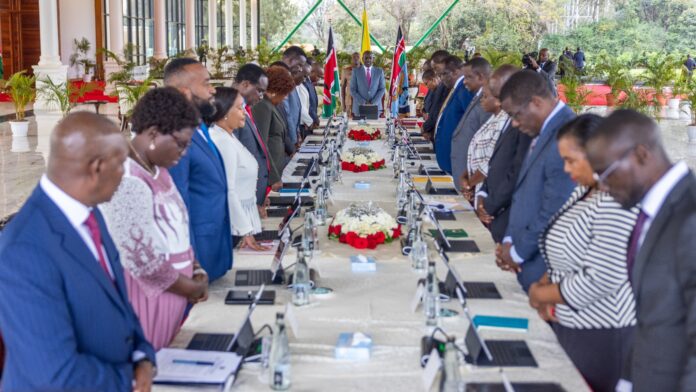In a move aimed at weeding out ghost workers in Government, the Cabinet has resolved to adopt a personnel identification system.
In a cabinet dispatch to newsrooms on Tuesday, September 17, the cabinet approved the Implementation of a Unified Personnel Identification system to eradicate ‘ghost worker’ payroll fraud across all levels of Government, including constitutional commissions.
This is expected to save the government millions which are being siphoned through an exaggerated wage bill.
At the same time, as pressure mounts on the Kenya Kwanza government to show accountability in the use of public resources to curb corruption, the Cabinet approved surcharges against any public officer whose actions led to the loss of public resources.
“The implementation of a Unified Personnel Identification system to eradicate ‘ghost workers’ payroll fraud across all levels of government, including constitutional commissions,” the Cabinet dispatch read.
The officer will be held liable if his omissions lead to losses, in line with Articles 226(5), 201(d), and 232(b) of the Constitution.
To ensure timely investigation and prosecution of corruption and economic crimes, the Cabinet resolved to amend relevant statutes such as the Evidence Act and the Criminal Procedure Code to ensure that corruption cases are concluded within six months.
Additionally, government officials involved in corruption scandals will face expedited prosecution.
Going further, the Cabinet also agreed to create a legal and institutional framework for the mandatory and ongoing vetting of all public officers, centralising wealth declarations under a single government office.
They committed to prompt investigation and prosecution of corruption and economic crimes, proposing amendments to the Evidence Act and the Criminal Procedure Code to ensure that corruption cases are resolved within six months.
Furthermore, the government plans to review and amend the Witness Protection Act to offer better incentives and protections for whistleblowers.
According to the Cabinet, the transition to a zero-based budgeting system will begin in the Financial Year 2025-2026.
The state also plans to review the VAT refund process to enhance openness, transparency, and accountability.
“To institutionalise the governance reforms, Cabinet sanctioned the conclusion of the ongoing stakeholder consultations, ensuring that public participation remains at the heart of the process,” the statement reads.
“The outcome of this consultative process will be considered by Cabinet at the next meeting as the Omnibus Bill on Governance,” he added.
This was the first cabinet meeting chaired by President William Ruto after the reconstitution of his cabinet following the nationwide protests against his regime.



















